

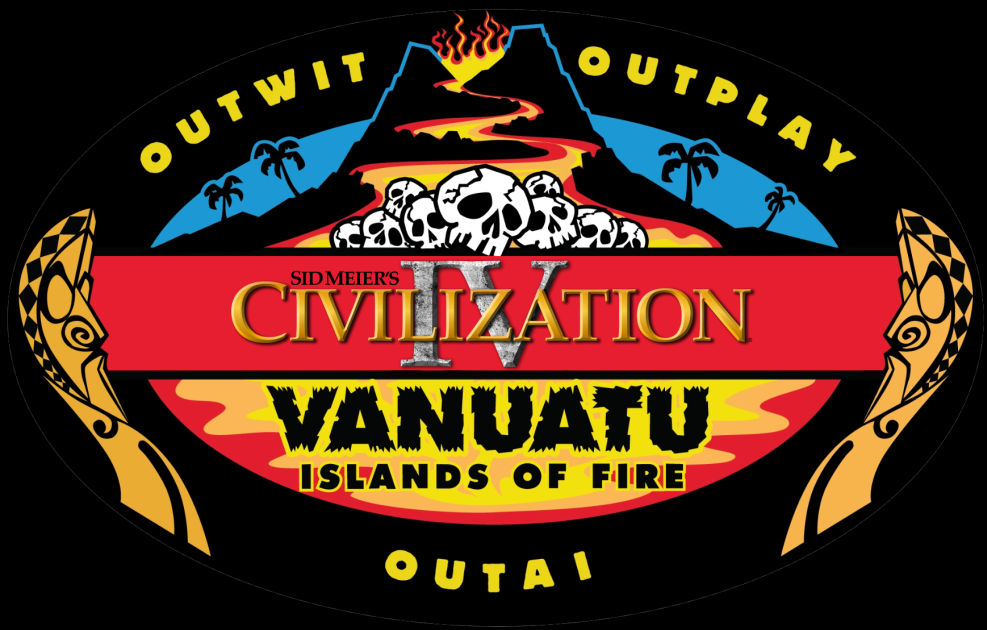
This summary for the Wildcard Game was written by Eauxps I. Fourgott. Many thanks for volunteering to put this report together! 
With the opening round of Season Seven now in the books, there was only one thing left to take care of before the playoff round proper could begin: the Wildcard game. As always, all leaders who had neither died nor secured a top two spot in the first eight games now got one last chance, squaring off against each other in one more game to decide who the last two playoff leaders would be. That was normal; what was unique about this wildcard game was that this particular group of leaders consisted exclusively of aggressive leaders with low peaceweights. Normally there's at least one or two high peaceweight leaders who skate through, but this season every single one who hadn't finished in the top two had been outright eliminated. As a result, it was Huayna Capac and Saladin who formed the comparatively pacifistic contingent in this game, while the others - Tokugawa, Boudica, Napoleon, Julius Caesar, Peter, Shaka, and Gilgamesh - were even more aggressive and would declare war at the drop of a hat. The multitude of chaotic warmongers, lack of one clear target for them to unite against, and raging barbarians that were turned on specifically for the Wildcard game ensured that this would be an unpredictable contest, but there was still a clear community favorite: Huayna Capac, who in addition to his amazing AI Survivor track record had a starting position with a ridiculous THREE gold resources in the capital's city radius. If he could execute a competent opening, he might quickly become unstoppable, especially as the only strong economic leader in this warlike field.
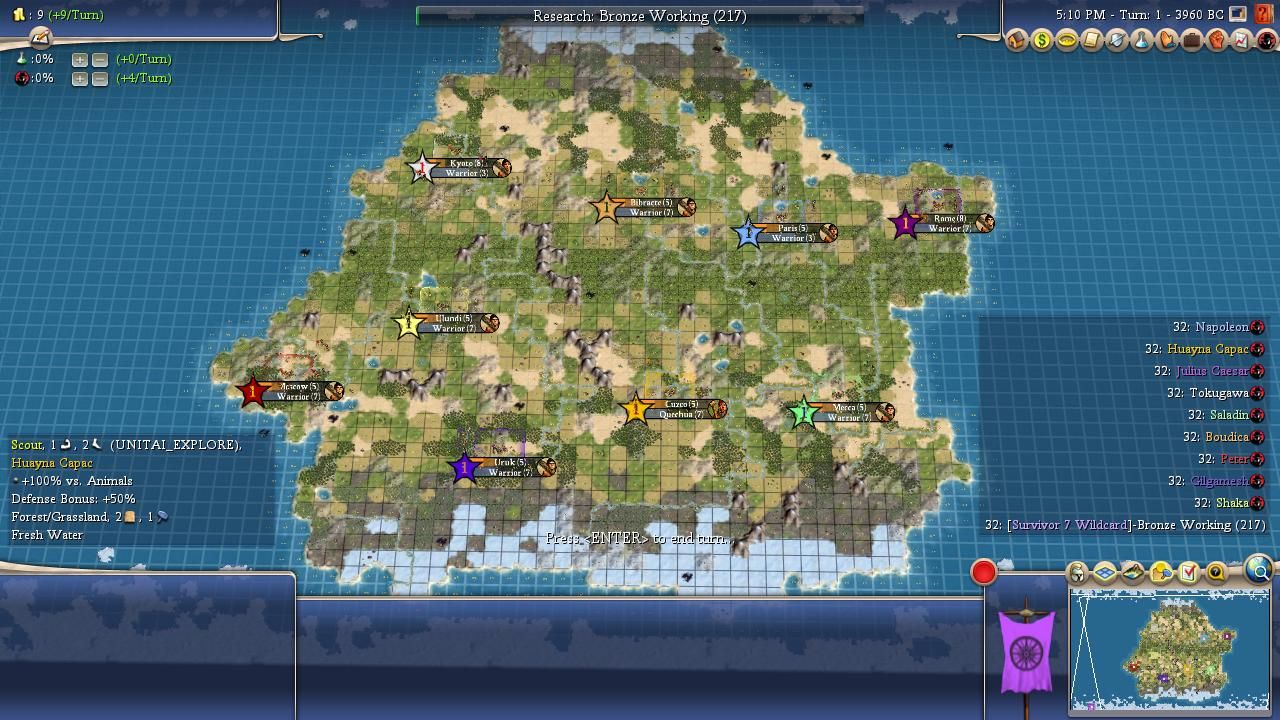
The first obstacle that everybody had to face in this game was the raging barbarians, who were out in full force across the map by Turn 20. Hordes bearing the black flags were soon swarming across AI territory, ripping up many of the early tile improvements and in general stunting everybody's development. They ultimately didn't pose too major of a threat: no AI ever had a city captured by the barbarians in this game, perhaps as a result of the field's high unit training emphasis, but many of the leaders still had to deal with their progress being essentially reset by all of the pillaging. Probably the leader suffering the least from this was the rather sheltered Julius Caesar, but he had plenty of problems of his own to deal with. The land around his starting position was very low quality, mostly covered in forest and jungle and with very few useful resources. He further compounded the problem by deftly maneuvering around the few resources that would have helped him, even as he expanded more quickly than any other leader. The result was a bunch of very low-quality cities, barely any commerce production at all, and thus a sputtering economy that, for instance, took 15 turns to research The Wheel. Caesar would need Bronze and Iron Working to really get off the ground, and little as he might be suffering from the barbarians, it still might be too late for him to really make an impact by the time those techs came in. And his sheltered position was a double-edged sword: even with the fastest expansion rate on the map, he was virtually out of room to expand at five cities.
Among the other leaders, Tokugawa was having the roughest time early on. He had the most isolated position and thus plenty of space to expand into, but that was also plenty of space for barbarians to spawn and subsequently harass his civ, resulting in particularly stunted early growth. Saladin had chosen an unproductive early tech path that left him unable to build any tile improvements except for roads - but thanks to the barbs, he actually wasn't missing out on very much! His opening was quite unimpressive, but the slowdown the raging hordes put on this game kept him viable in the long term. Saladin had chosen not to go for a religion out of the gate, resulting in Boudica and Huayna Capac founding the first two faiths, but while Boudica's would eventually spread across the north of the map and Huayna's across the south, neither one had a major impact in the early game. Huayna's position had a lot of potential but for now was held back by the barbs, while Bouidca had a fairly average opening without anything particularly noteworthy. Napoleon had also made a bid for one of the first faiths, which ended up being a very good thing as it meant he unlocked monuments far earlier than he otherwise would have, erasing one of the usual big problems with his early game and allowing him to get off to a pretty good start. Shaka was looking great in the early going, expanding at a good clip and not seeming to struggle as much as others did with the barbs - perhaps his position in the center of the map helped here. Gilgamesh had another average opening and so far was one of the less interesting AIs in this game. Finally, Peter built the Great Wall, a great asset against the barbarians - except that most of the spawning ground around his position was filled up by the time he finished the wonder, and the production tied up on it had served to slow his expansion, leaving him in an unremarkable position.
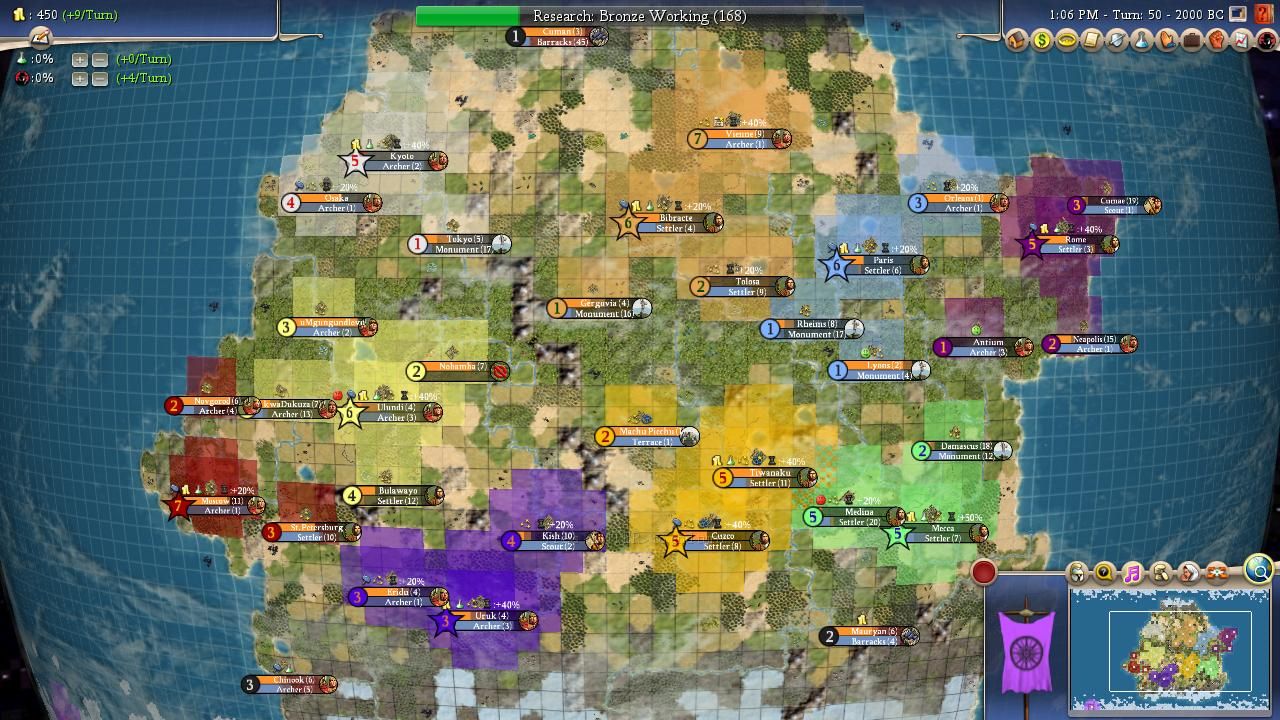
By Turn 50, the middle of the map had mostly been filled out, and the barbarians were largely consigned to the northern and southern regions, allowing cities in the middle to finally start developing normally. Even those extreme frontiers were getting pushed back; Boudica and Napoleon kept sending unescorted settlers to the north, yet somehow managing to get away with founding defenseless cities and having them left unmolested until defenders finally got up to them. At one point Boudica even founded one directly next to a barbarian archer, only for the archer to move AWAY from the city and give her the chance to garrison it!  Everybody was expanding at a roughly even rate at this point, all but Huayna out to at least six cities by Turn 80 and none out of the running just yet - although a couple of leaders were looking notably weaker. Caesar's economy was still struggling, but so was Shaka's, as his land was similarly weak and that strong rate of expansion from earlier had now crippled him with city maintenance costs. By contrast, Peter was too slow of an expander, sitting on just four cities for ages and claiming very little land when he finally founded two more, and Saladin had similarly expanded slowly and done little of note so far, leaving him seemingly behind. On the flip side, Boudica was starting to lead the field, claiming a lot of land and poised to gain even more thanks to her northern location. She and Tokugawa's nations were getting noticeably larger than the others, and with the threat posed by the barbs now waning, their open positions were turning into a significant advantage. On the economic front, even though he was the only leader with just five cities, Huayna was expectedly leading the field by a good margin in GNP. Triple riverside Financial gold was carrying him here in the early game, and as the only Industrious leader he was also claiming many of the early wonders to build up what promised to be a prosperous civilization - if he could defend it, and if his low city count could scale into the later game.
Everybody was expanding at a roughly even rate at this point, all but Huayna out to at least six cities by Turn 80 and none out of the running just yet - although a couple of leaders were looking notably weaker. Caesar's economy was still struggling, but so was Shaka's, as his land was similarly weak and that strong rate of expansion from earlier had now crippled him with city maintenance costs. By contrast, Peter was too slow of an expander, sitting on just four cities for ages and claiming very little land when he finally founded two more, and Saladin had similarly expanded slowly and done little of note so far, leaving him seemingly behind. On the flip side, Boudica was starting to lead the field, claiming a lot of land and poised to gain even more thanks to her northern location. She and Tokugawa's nations were getting noticeably larger than the others, and with the threat posed by the barbs now waning, their open positions were turning into a significant advantage. On the economic front, even though he was the only leader with just five cities, Huayna was expectedly leading the field by a good margin in GNP. Triple riverside Financial gold was carrying him here in the early game, and as the only Industrious leader he was also claiming many of the early wonders to build up what promised to be a prosperous civilization - if he could defend it, and if his low city count could scale into the later game.
And so, of course, Huayna made the worst possible move he could have in this situation: he declared the game's first war, attacking the score leader in Boudica. Settling more cities, peacefully building up, attacking a weak neighbor, anything would have been better than wasting his resources here! And a waste this proved; the two leaders clashed for about 40 turns with no cities changing hands before eventually signing peace. The difference was that Boudica already led one of the largest civs on the map in the game at the start of the war, so she still sat atop the scoreboard at the end of this pointless conflict. Huayna was near the top as well thanks to his excellent economy, but he had only six cities - less than all but two of his rivals - so while he was in good shape for now, his long-term prospects were more dicey. It wasn't the rosiest outlook for Boudica, either; she had a large empire, but her economy was quite bad, and if she couldn't get it in shape quickly enough, she could fall too far behind to recover.
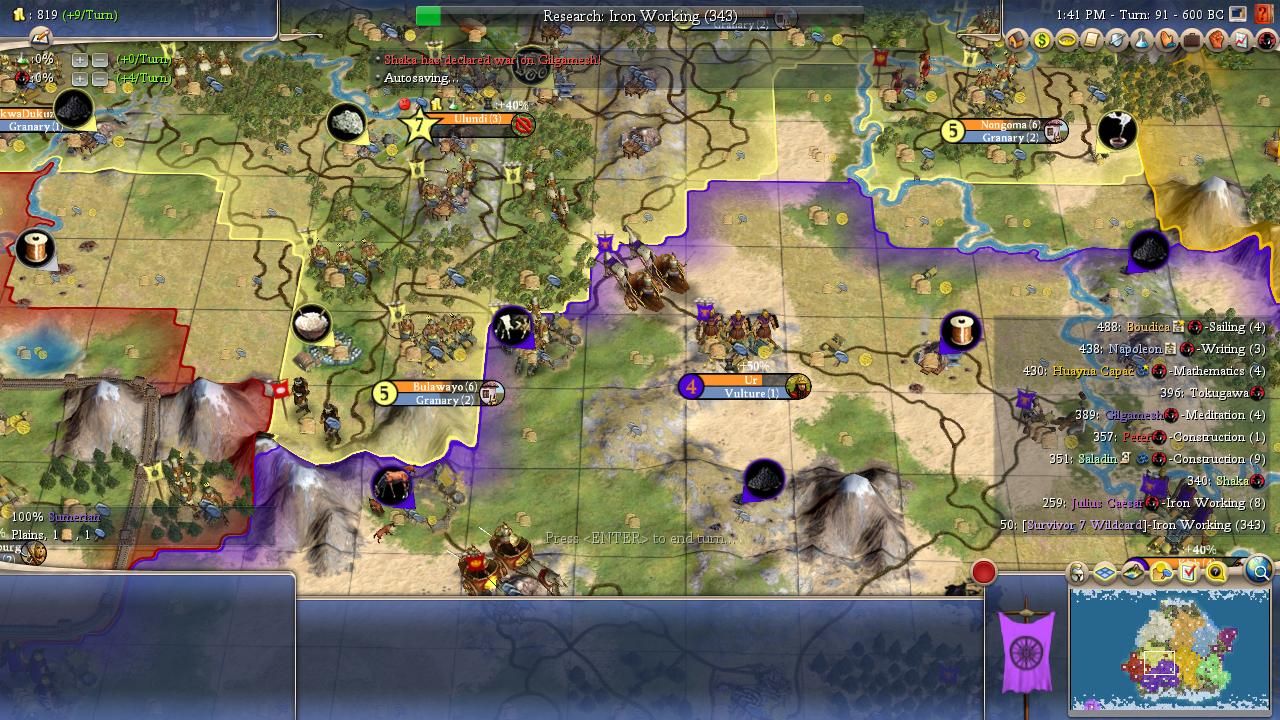
Elsewhere on the map, Shaka attacked Gilgamesh in an ill-advised war. A Sumerian stack quickly marched up and captured a Zulu city that didn't even control its first ring, and Shaka was left with just five cities and a terrible economy of his own. Without catapults, Gilgamesh couldn't make any more progress right now and the war settled into stalemate, but he was clearly the stronger party. In the northeast, Julius Caesar attacked his closest neighbor in Napoleon, who'd been busy revisiting his pacifist strategy from last game; Napoleon's distraction changed this from a suicide attack by Caesar into another stalemate. As for the leaders still at peace, Peter was wisely waiting to plot war until he teched an early Construction. He'd done the best job of economic development in this game, putting down a lot of cottages and becoming competitive with Huayna's triple gold start for the GNP lead. He began plotting war soon after Construction came in, too, and with catapults included in his stacks, his attack could prove decisive. Tokugawa was still expanding via both peaceful means and barb city captures, growing to a large size, and without wasting any resources on pointless early wars, he was rising up to one of the top positions. Saladin also was rising on the scoreboard despite slow expansion, as the fertile river valley his civ lay in allowed him to start building a strong economy. He lacked metals for over 100 turns, but with nobody else attacking him, this only served to guarantee that he wouldn't waste early production on stalemates, allowing him to peacefully grow instead.
After some 50 turns of largely inconsequential wars, more important conflicts started to erupt. Over in the southwest, Peter revealed his war target: Gilgamesh. Crashing into an enemy already tired from a stalemated war, Peter immediately halted all Sumerian progress into Zululand, and soon gained two cities and a definitive upper hand in a neat little war that was quickly wrapped up via peace treaty. In the east, Julius Caesar didn't rest for long after his war with France before trying a different target, this time Saladin. However, Saladin was clearly the stronger party in this matchup, and soon cleaned up Caesar's attacks and went on the offensive himself. He could have easily conquered all of Rome, but instead decided to settle for just taking one city in combat plus another one in a peace treaty - another quick war with minor gains to show for it. Even more decisive than these conflicts, though, was the big fight that soon took place in the center of the map, as both Tokugawa and then Boudica attacked Shaka just as he'd been finally going on the offensive against Gilgamesh. These were two of the strongest leaders on the map, and Shaka and his exhausted five city empire had no way to fight back. Toku and Boudy each took two cities, then advanced along with Gilgamesh on the final city. It was a complete tossup who would get the kill credit, but ultimately the honor went to Boudica, with Shaka ending up as the first to die.
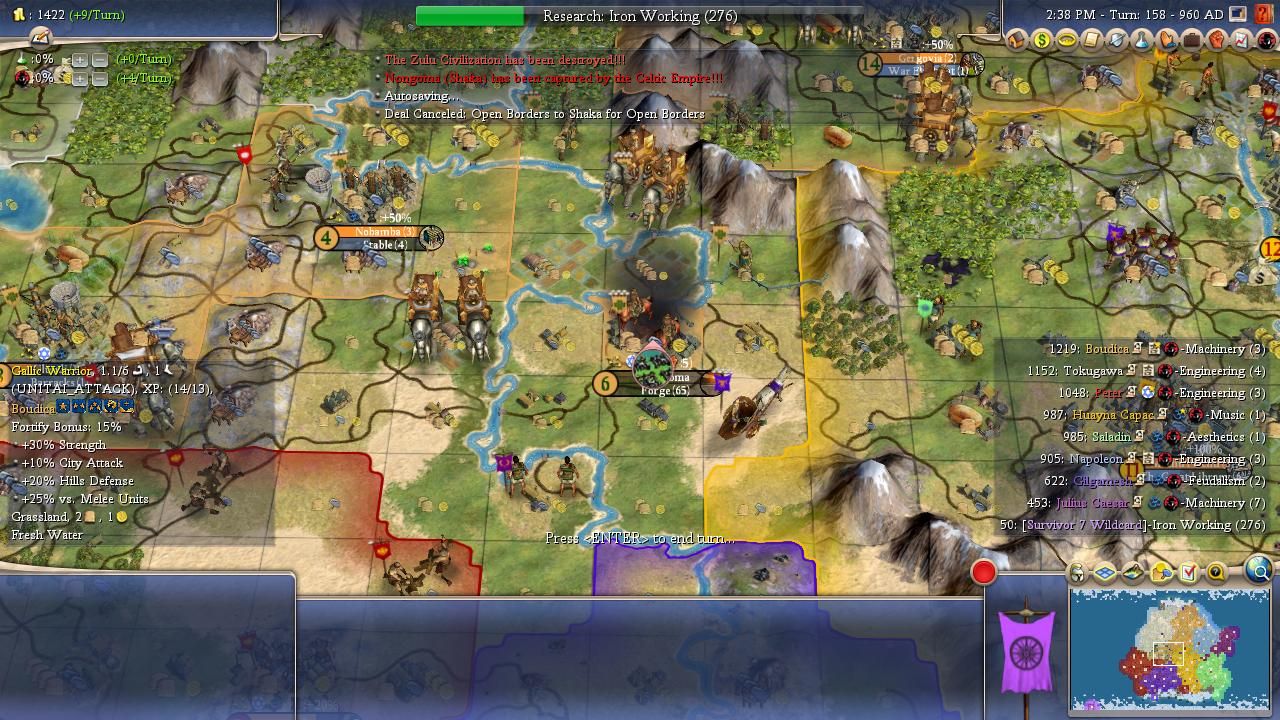
Shaka had a rough position here, with limited room to expand and a lot of difficult terrain that needed time and care to develop properly. But he also did himself no favors; his early expansion looked good but also crashed his economy, and from that point on he was limping along and not advancing his civilization at all for ages. This left him as one of the weaker powers and with no good path to victory; he was already in deep trouble even before he got stuck in a three-front war, and I don't know if it even was possible to build to a winning position from his starting location. He tried to fight his way out but simply didn't have the resources needed to pull it off; it was quite a fall from his almost-game-winning position back in Game One.
This map now had a clear power duo in command, as Boudica and Tokugawa had bolstered their already-leading positions through some easy conquests. They were certainly the two most intimidating leaders in the game right now, and very importantly were also best of friends - thanks to the combination of their shared Confucian religion and their shared war against Shaka, they loved each other and would not declare war, allowing each one to pursue another target without having to worry about a backstab. The next leaders on the totem pole were Peter and Saladin, who'd both gotten modest wartime gains of their own with little trouble but were still smaller than the big dogs; they'd each need some luck to reach a top two spot and a lot of luck to win. Huayna Capac and Napoleon were next, mutually dragged down by a war declared by Napoleon that had seen no lasting territorial gains yet. Huayna had started this war in front with maces and crossbows, but Napoleon had closed the tech gap during the fighting, and the two were roughly even in power - it seemed that third-party intervention would be needed to decide this conflict. Huayna was still at the top of the field in research, but his small size continued to be a concern. Finally, Gilgamesh and Julius Caesar were at the bottom of the leaderboard, both weakened leaders who clearly were done as big movers in this game.
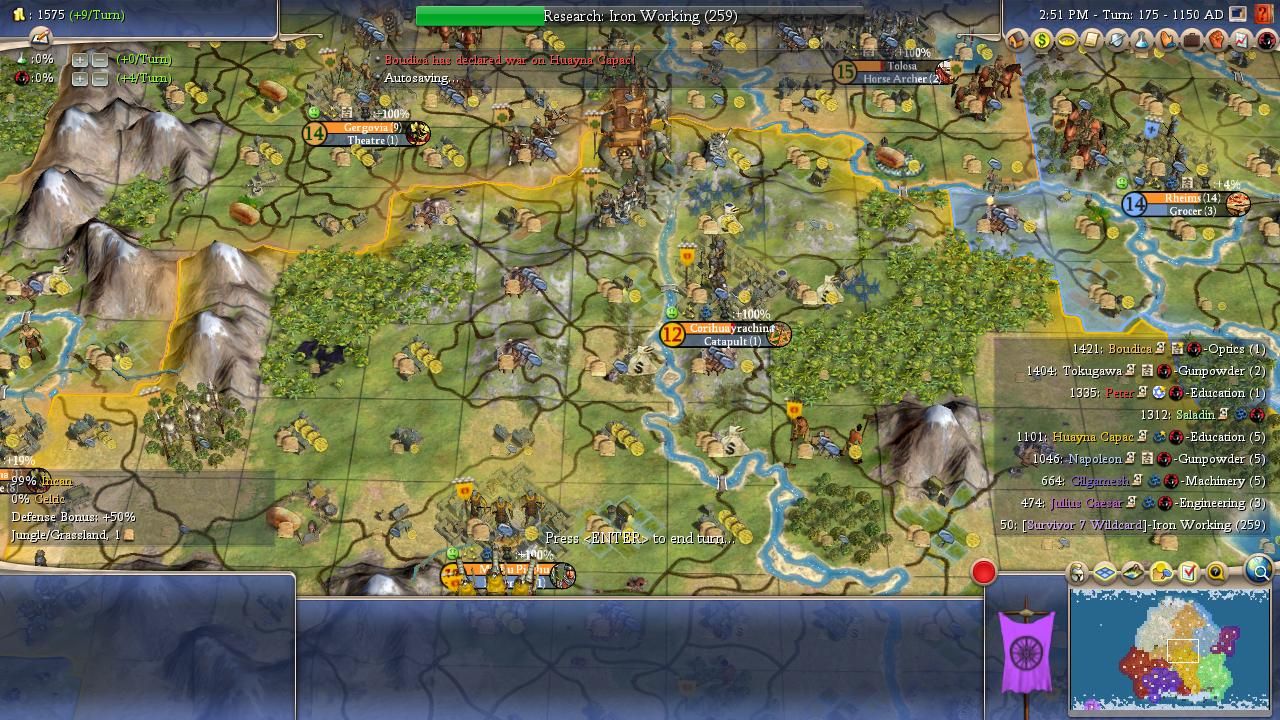
Just because those two were at the bottom, though, didn't mean they weren't determined to fight for their spot! Shortly after Shaka's exit, Gilgamesh declared war on Peter on the same turn that Huayna bought Caesar in against Napoleon. However, these wars went about as well as you might expect; neither one ever put their opponents in any danger, and very quickly found themselves on the defensive once more. Caesar was lucky and able to barter one more city away for peace, surviving yet longer with just three cities remaining, but Peter didn't seem interested in peace with Sumeria, and although his early progress was slow, he was the clear winner in this war and eventually started pushing in. Meanwhile, a very big war declaration broke the stalemate between Huayna and Napoleon: hungry for some revenge for his earlier attack, Boudica declared war on Huayna Capac!  This was disastrous news for the Incan leader; despite the difference in their economies, Boudica had kept up in military tech, and Huayna had no answer to the 50-strong Celtic main stack. Soon his cities were going down as well, yielding some choice land and a second highly profitable shrine to Boudica to keep her economy afloat. As the two Pool One leaders were getting ground down, Saladin and Tokugawa both continued to simply watch from the sidelines for now. They were the first two leaders to tech Rifling in a fairly early beeline, but neither seemed interested in actually using this tech edge against somebody else.
This was disastrous news for the Incan leader; despite the difference in their economies, Boudica had kept up in military tech, and Huayna had no answer to the 50-strong Celtic main stack. Soon his cities were going down as well, yielding some choice land and a second highly profitable shrine to Boudica to keep her economy afloat. As the two Pool One leaders were getting ground down, Saladin and Tokugawa both continued to simply watch from the sidelines for now. They were the first two leaders to tech Rifling in a fairly early beeline, but neither seemed interested in actually using this tech edge against somebody else.
The race for elimination ended up being very close, but by just a couple of turns, it was Huayna Capac who was knocked out next, Boudica getting the kill and all of his cities (save one that Napoleon sniped). Expectations had been high for Huayna going into this map, but between the lack of food on his triple gold tiles and the warmongering field of foes, it was always going to be a hazardous position for him as the least military-focused player on the map. He got his economy off to a fantastic start, but made a fatal mistake by attacking Boudica so early. There hadn't been any hope of this bettering his position, and so he not only stalled himself out but also made a very powerful enemy, digging his own grave for later. I think that if he had avoided any early wars, he would have had an excellent shot of running away technologically and winning easily. There was never any guarantee that he'd actually be able to do that, but he himself put an end to any such hopes, so his elimination here is not undeserved. Huayna is not the #1 ranked leader in AI Survivor for nothing, but this season did not see him playing at his best, and so he is missing the playoffs for only the second time in his career.
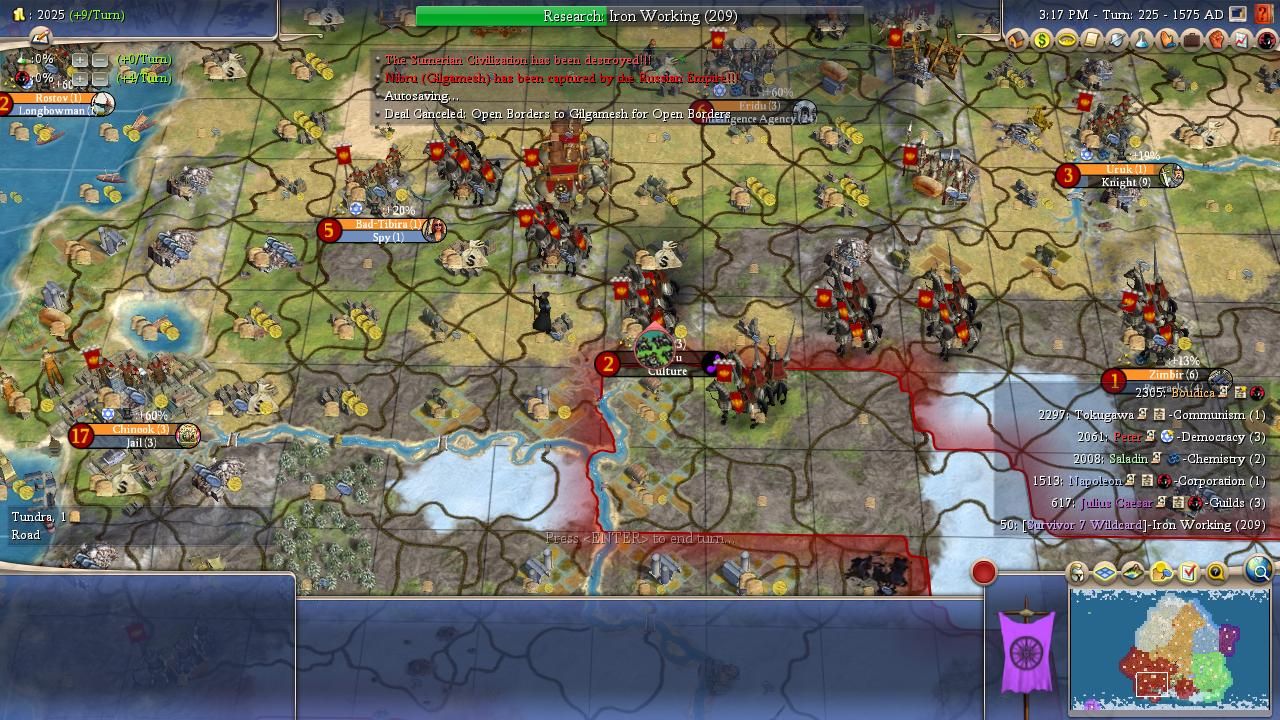
Peter wiped Gilgamesh out soon afterwards, and with just one point on the season, Gilgamesh will be moving down to Pool Two next time. Unlike the first two eliminees, though, Gilgamesh didn't do anything really wrong to deserve his fate here. His opening wasn't fantastic, but it was perfectly solid, setting him up with a lot of potential... only for Shaka to trap him in an early war that he couldn't win without catapults, and Peter to then backstab and permanently cripple him. Neither of those wars was Gilgamesh's fault and he didn't fight badly; he was just stuck in a bad situation and from there had no path to recovery. You can't really fault him for his late suicide attack when he'd already lost the game by that point. And so, much like Huayna, a leader who was tantalizingly close to a playoff spot in his opening round game is instead out in the Wildcard. It would be two lower-ranked leaders moving on this time. Coming out of these wars, Boudica now had a definite edge, but her lead still wasn't that big yet. She, Tokugawa, Peter, and Saladin were all fairly close together and all four had a realistic chance at a top two finish still; it was only a conquest-less Napoleon and the tiny Julius Caesar that were truly out of it. But Boudica and Tokugawa still had an iron bond and would not attack each other, and it was hard to imagine either one of them falling as long as this remained the case.
It wasn't long before the warmongers were back at it; this time, Boudica attacked Peter while Napoleon moved in to finish off Caesar. It was actually Boudica making fast progress early on; she and Peter both had Rifling tech at the outset of this war, but Peter had just researched it and not upgraded most of his units yet. He also was strangely still building knights and pikes in a lot of his cities instead of the more modern units. As a result, Boudica's more advanced military was having a field day, and quickly took a large number of outlying Russian cities. Her progress slowed down once she started advancing into Peter's core, but it did not stop, and he was clearly on his way out. On the other hand, despite being the one to declare war, Napoleon sent no stack into Rome at first, only a few isolated soldiers that couldn't accomplish anything on their own. It took him much longer to get going... but still, Caesar had only four cities, compared to over twenty for France. Essentially as soon as Napoleon actually started pressing his attack, Rome was gone. Julius had been stuck in a similar situation to Shaka in this game, saddled with a difficult starting position that perhaps no leader could have won from. The lack of barb pressure did not make up for the reduced space to expand into, and all of the terrain was tough to work with, dooming him to a slow start. He made his best effort of it, settling far and wide to get whatever spots he could and going out and attacking others rather than sitting back and waiting to be conquered, but ultimately he didn't have the economic skill to come out of the landgrab in a competitive position, and so it was only a matter of time. Still, he was quite lucky to have even reached this game in the first place, so perhaps there's no ground to complain about his fate in it.
Peter surely would have been the next leader to go, Boudica having knocked him down past the point of viability, but then suddenly the game took a dramatic twist:
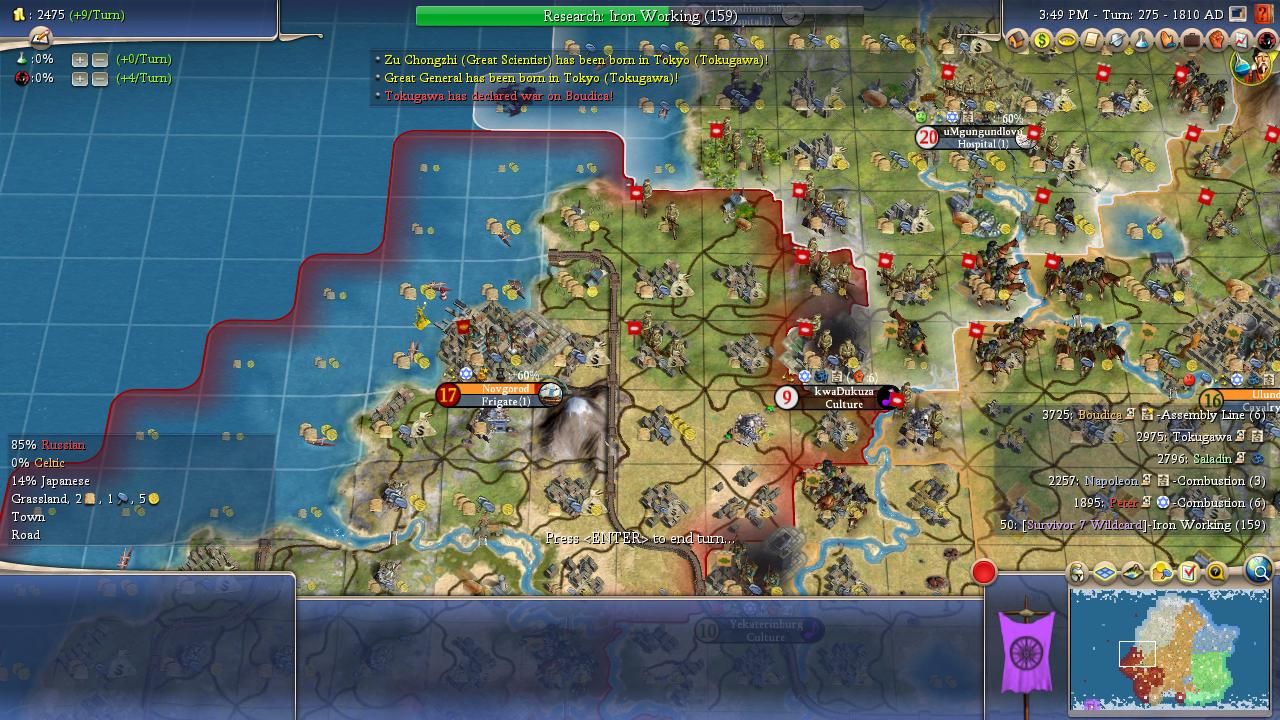
Toku attacking Boudica?!?!?  This one was a true headscratcher, as he'd still been Friendly towards her the last time we'd checked - and indeed, reloading to a turn before to check again showed that this still was the case right before the war started. He shouldn't have been attacking her at all! There must have been a brief window of time earlier when he'd dropped to Pleased, begun plotting, and then continued with his plans after going back up to Friendly - unbelievable. This had to be one of the most unlikely backstabs we'd ever seen. Regardless of likelihood, though, it had happened, and now both leaders had to reckon with the results: instead of easily coasting into the top two spots, they were now fighting tooth and nail to be the one to advance. Both leaders had very large armies and their soliders were very well-promoted thanks to Boudy's Aggressive/Charismatic and Toku's Aggressive/Protective trait combos. However, Tokugawa's long period of peaceful teching had resulted in him having the superior economy and tech lead; he was up infantry over Boudy at the start of the war, and once she teched Assembly Line, he countered by teching Industrialism for tanks. Boudica's entire economy was also in shambles now, as she was absolutely wracked by war weariness from both Toku and a Peter who still held the Statue of Zeus. Her army was significantly bigger than Toku's to start, and there was no definitive conclusion in the war's early going, but it eventually became clear that she was losing power at a faster rate, and he was gradually coming out ahead.
This one was a true headscratcher, as he'd still been Friendly towards her the last time we'd checked - and indeed, reloading to a turn before to check again showed that this still was the case right before the war started. He shouldn't have been attacking her at all! There must have been a brief window of time earlier when he'd dropped to Pleased, begun plotting, and then continued with his plans after going back up to Friendly - unbelievable. This had to be one of the most unlikely backstabs we'd ever seen. Regardless of likelihood, though, it had happened, and now both leaders had to reckon with the results: instead of easily coasting into the top two spots, they were now fighting tooth and nail to be the one to advance. Both leaders had very large armies and their soliders were very well-promoted thanks to Boudy's Aggressive/Charismatic and Toku's Aggressive/Protective trait combos. However, Tokugawa's long period of peaceful teching had resulted in him having the superior economy and tech lead; he was up infantry over Boudy at the start of the war, and once she teched Assembly Line, he countered by teching Industrialism for tanks. Boudica's entire economy was also in shambles now, as she was absolutely wracked by war weariness from both Toku and a Peter who still held the Statue of Zeus. Her army was significantly bigger than Toku's to start, and there was no definitive conclusion in the war's early going, but it eventually became clear that she was losing power at a faster rate, and he was gradually coming out ahead.
Meanwhile, Saladin finally made his first big move of the game: rather than go for a dicey war with one of the big dogs, he attacked an easier target in Napoleon. The first few turns of this war were extremely bloody as Napoleon's big stack was holed up in the first city that Saladin attacked; it took quite a few turns for this siege to produce a result, but once the dust finally cleared, Saladin had taken the city, and from that point on it was all downhill for him. He was clearly a stronger leader than Napoleon at this point. While he started to roll through France, Toku and Boudica continued their brutal war. Large though Boudica's empire and army were, Tokugawa had by now taken the lead in power, and slowly but surely was pressing in, starting to take more and more cities. Soon enough Boudica had fallen down from her first place position down to third place, now out of the running for a playoff spot. But hers had been a mighty nation indeed, and so was able to hold out for far longer than Napoleon's; she still had over 15 cities remaining when Saladin struck the killing blow against the French leader.
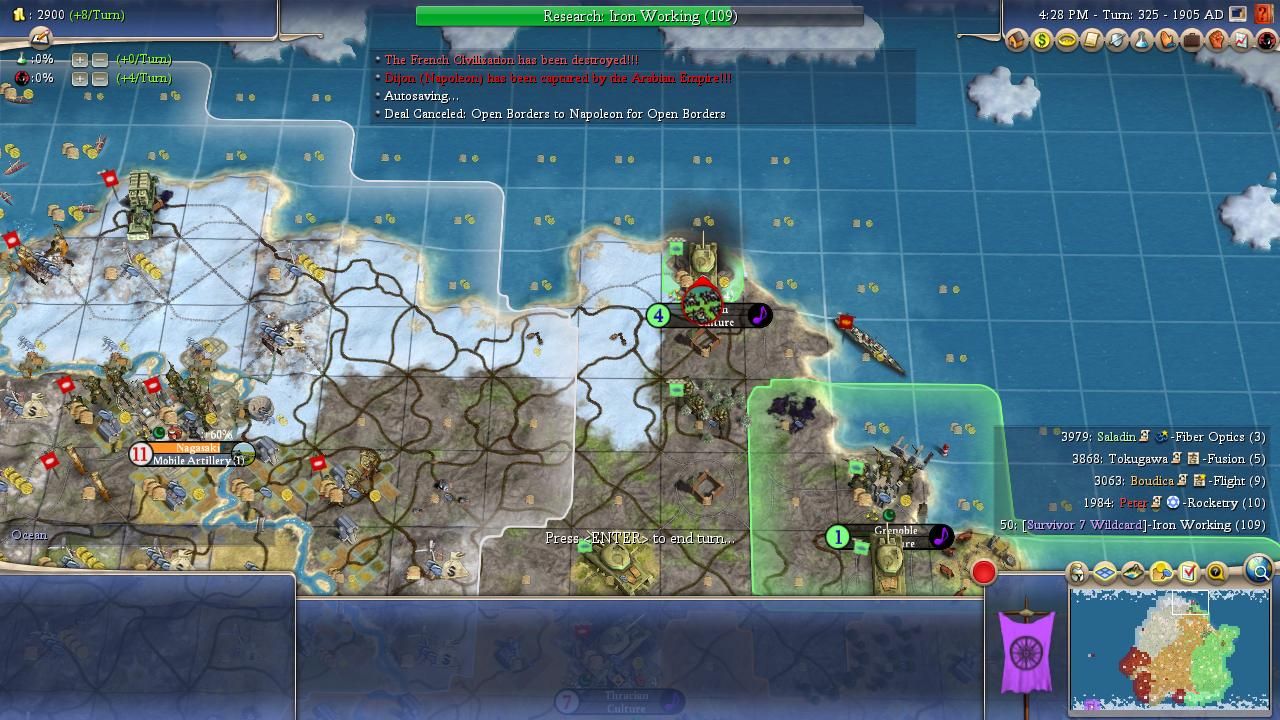
Napoleon had gotten out to a promising start in this game, but then ground to a halt when the expansion phase ended and the warring phase began. He waited possibly longer than he should have to attack somebody, staying at the same size while several other leaders were growing, and when he finally did launch an invasion, he chose his target poorly, stalling out against Huayna Capac's superior force and only eventually getting a single city for his troubles. For as military-focused of a leader as Napoleon, that wasn't enough to keep up, and so he was relegated to the role of second-rate power, his death likely inevitable in as violent of a game as this one. He exits the season with three more kills to bolster his impressive total, but could not manage a second straight playoff appearance.
We were now in a very tight endgame race for the victory. Saladin and Tokugawa had been the two tech leaders for a long time, and even now were neck-and-neck as they started researching the final techs in the tree. Saladin opened up a small lead in beaker count at this point as he exited war mode and was able to focus solely on teching, while Toku was still stuck fighting Boudica. That war had now tilted decisively in Japan's favor, and the pace of conquest was starting to pick up as Toku got better and better lategame units and Boudica became less and less capable of resistance. Peter even got back in on the fighting after having peaced out earlier, successfully recapturing his entire core, albeit too late to compete for a playoff spot. Tokugawa captured the entire Celtic core and started to move into the ex-Sumerian and Incan cities that now were Boudica's last refuge, even as he and Saladin continued to research the endgame techs in a race that was too close to call. And then the game got one last wrench tossed in it:
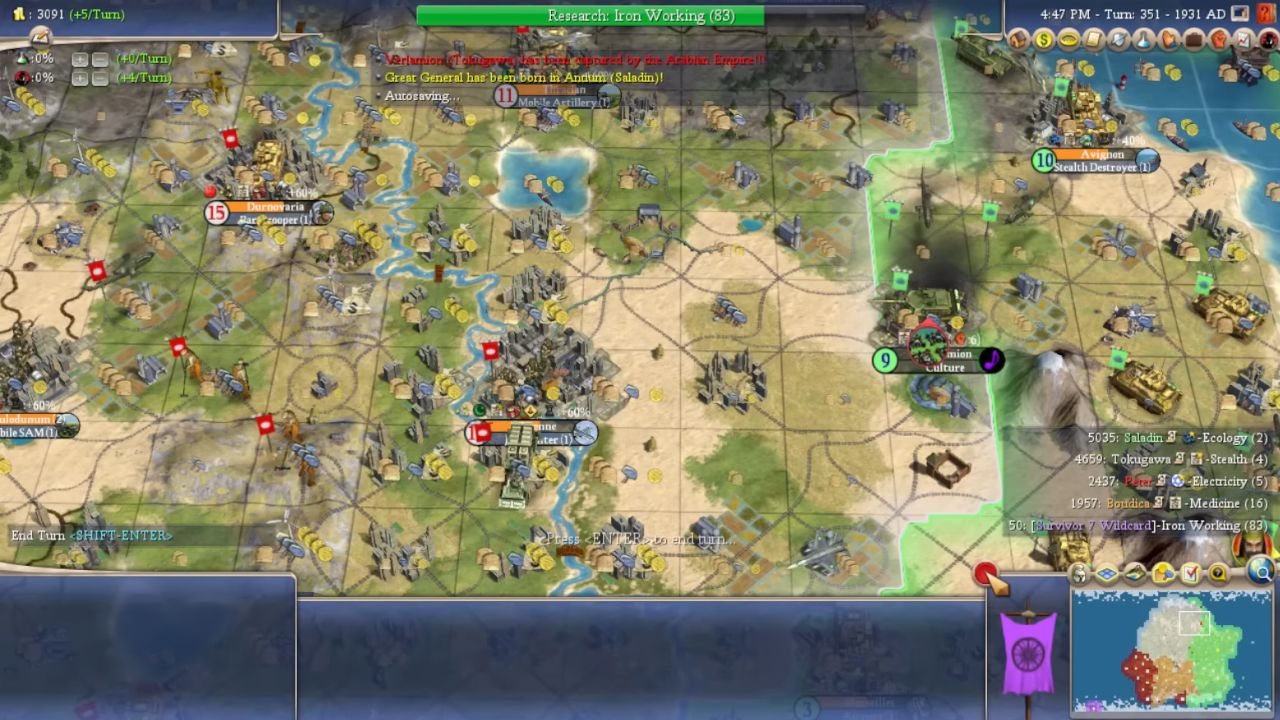
Saladin came plowing into Tokugawa in a last-minute backstab. Unlike other gigantic endgame conflicts that we've seen this season between two juggernauts, this one did not have an early period of stalemate where the two armies engaged in a gigantic clash. Instead, an already stronger Saladin had caught a tired Toku out of position, and so immediately had the upper hand and started pushing through his territory without facing meaningful resistance. This sealed Saladin's victory: Toku was now actually LOSING spaceship parts, whether as a result of his captured cities or of spying operations being undertaken at the same time. Sal had no such problems, and soon launched his spaceship on schedule; he probably would have been ahead by a couple of turns, but this war had sealed the deal. He continued to rip through Japan in the closing turns of the game, blitzing through Toku's territory and making it all the way to his core cities; if the game had gone on a little longer, he would have killed Toku and probably won a Domination victory. But it wouldn't come to that, and as it was, Toku's lead over the remaining two leaders had been big enough that he was still in second place by a good margin when the spaceship landed to give Saladin the victory.
Saladin's win here initially came as something of a surprise, given that he achieved nothing of note for much of the game. His opening was weak, his expansion was slower than it should have been, he sat around and just watched others conquer for long periods of time, and up until he declared war on Napoleon his total conquests in the game totaled one city. Yet it wasn't nearly as bad as it seemed: in a game where barbarians were spending the first fifty turns running around and ripping up everybody's tile improvements, Sal's failure to get any for a long time didn't actually hurt him significantly, and Huayna's similar failure to expand meant that Saladin's delays in this regard didn't cost him either. He had a comfortable corner position with few neighbors, leading to nobody except laughably weak Julius Caesar attacking him all game, he ended that one war stronger than he had been while wasting minimal time and resources, and his lush river-filled location was the perfect place to simply sit back and tech for ages, especially in a field of such weak economic leaders. Sal chose his battles wisely, avoiding dicey conflicts in favor of teching in front, and he was neck-and-neck with Toku as the tech leader for most of the game. When he did attack, he did so against a clearly weaker neighbor that he could surely beat, at a time when the rest of the world was distracted and wouldn't pose a threat, and that established him firmly as one of the game's top powers. Then at the end, he was able to get in the decisive first strike against a distracted foe, firmly asserting his dominance over Tokugawa and his claim to the victory. As with any winner, Saladin had some good luck in this game, but after a shaky start, he also played a smart game with the hand he was dealt. His failure to found an early religion also worked out well for him; he instead had adopted Huayna Capac's, leading to the two being good friends, and things might have gone very differently indeed had he been practicing a rival faith instead.
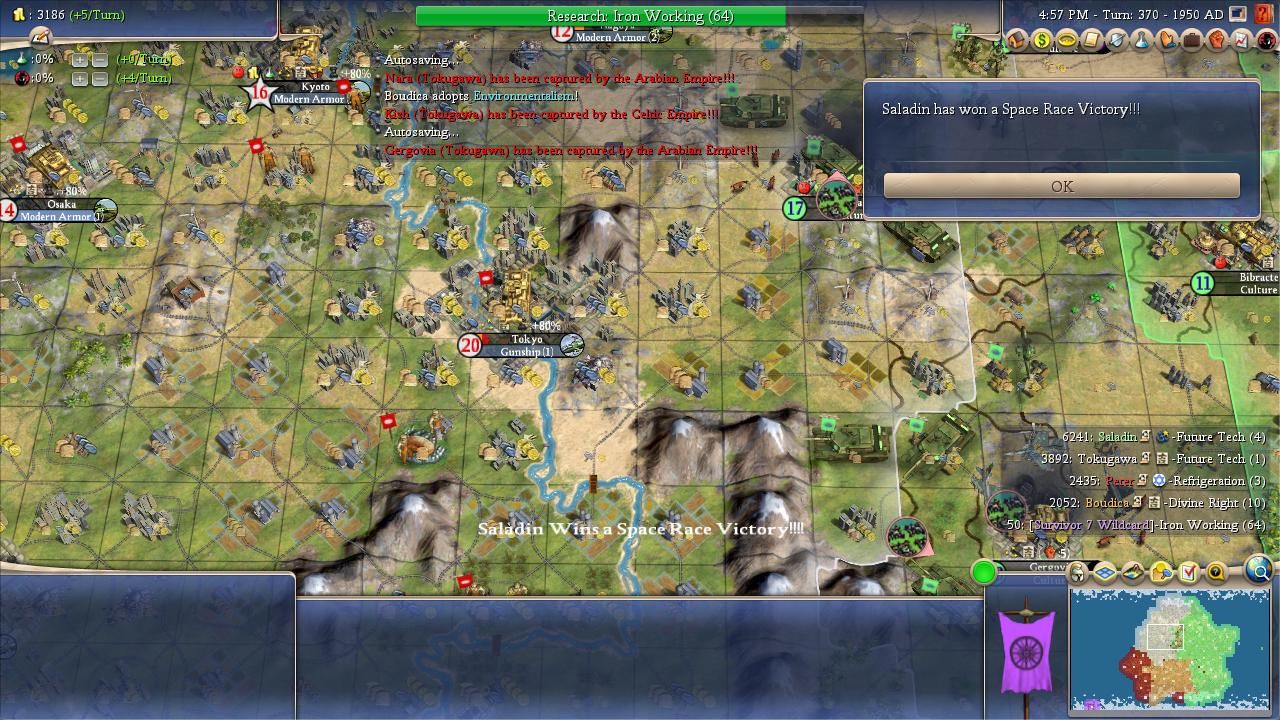
As for Tokugawa, his playoff position is deserved, but his path through this game wasn't the best. He did well early on, successfully fighting off his particularly nasty barbarian invaders to be able to take advantage of his open start, but then once Shaka had been eliminated, he needed to keep moving to keep up with a similarly strong Boudica next to him. He didn't, choosing to tech up instead, and while he did that well, it did leave him stuck in a situation where he needed to defeat her in order to have a reliable shot at a top-two finish. If he hadn't backstabbed her, this might very well have been a Boudica-Saladin ticket advancing, leaving him hanging. On the other hand, even though he was able to beat Boudica, her empire's immense size meant he had to expend an accordingly immense amount of effort to win that war, and that ultimately cost him the game by slowing down his research before leaving him vulnerable to Saladin's attack. True, Toku had a much less favorable position than Saladin later in the game, but he could have prevented that with faster action earlier on, perhaps attacking Peter shortly after Shaka's demise to grow to a large size well before Saladin. As it was, he mishandled a tricky situation, and it cost him the win. Still, he's moving on to the playoffs, where another warmonger-filled Game 2 has the potential to serve him as well as this game did.
Finally, Boudica and Peter both survive thanks to some timely interventions, but their seasons are now over. Both played well in this game and would have been deserving top-two finishers, but alas, the later events went against them. Peter's start was a bit slow, but ultimately I don't think that cost him very much, and he played the midgame quite well to establish himself as one of the major powers; however, his position simply had less space around it than Boudica and Tokugawa's, leaving him without the chance to become as strong as them until they were his only neighbors left, and Boudy choosing to attack him instead of Saladin was a factor beyond his control that cost him the game. Boudica's fate was even crueller, though; she played an excellent game almost all the way throughout, successfully leveraging her risky position as Toku did, building a sufficiently strong economy through spreading her early religion, growing to a large size in the early game, then repeatedly choosing smart war targets that allowed her to quickly conquer more land and command the biggest empire on the map. She would have likely been a shoo-in for a top two spot, had she not had the terrible luck to have a FRIENDLY Tokugawa make plans to backstab her during a narrow window of opportunity, followed by that attack coming in at the worst possible time to completely derail her game. She'd done everything right to cultivate Toku as a reliable ally, he should never have attacked her like that, and in the end she got a raw deal indeed. That's how it goes sometimes, though, and there's always next season...
The setup for this game had promised an eventful match, and it certainly delivered on that promise in one of the longest AI Survivor streams of the season. Four different leaders had seemed like the most likely contender for the win at some point, their various rises and falls making for quite the set of twists and turns, and we were kept guessing the final result until the very end. The length of this game showed why it's a good thing that normal games are played with a smaller field, but as a once-a-season event, the Wildcard game continues to be a great addition to the competition. Thanks as always for watching and reading.



